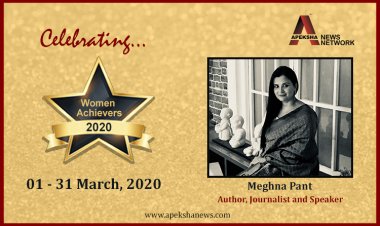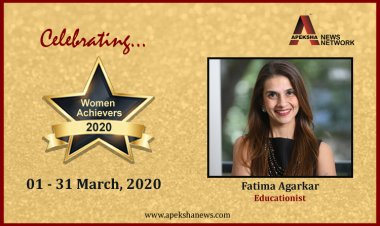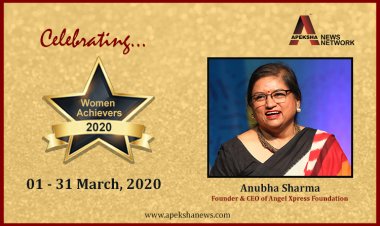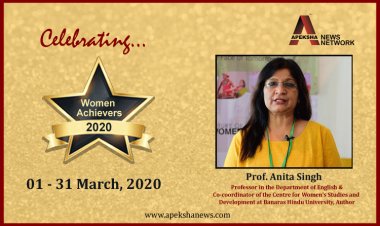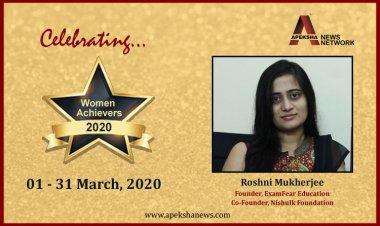“The present-day youth considers old literature to be a bit difficult and outdated,” says Author Ankita Jain
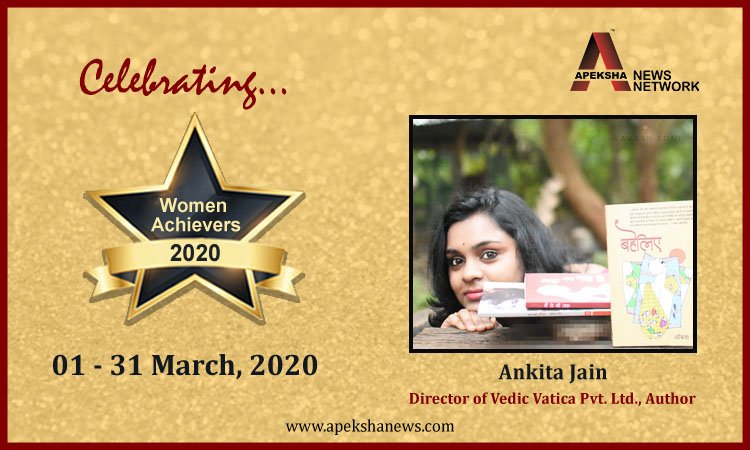
Ankita Jain rose to fame with her column ‘Maa-in-Making’ in a weekly magazine, which was based on the 9 months of pregnancy. It not just inspired innumerable men and women by making them aware about the sensitive topic towards women safety and health, but also was then compiled in the form of a book, which became one of the best-seller.
After completing her M.Tech in computer science from Bansthali Vidhyapith, Ankita joined CDAC Pune to work as a research associate in the field of artificial intelligence. Her next stint was in Bansal College Bhopal, where she worked as a Lecturer but after facing dullness of job routine, she decided to join the world of writing and for next 3 years she published a magazine, ‘Roobru Duniya’.
Currently, Ankita is the director of Vedic Vatica Pvt. Ltd., an agro researcher and manufacturer. This umbrella project has been started by her husband Samarth in 2014 with an aim to focus on organic agro and personal care products. The firm also provides free and extensive training to small-scale farmers in order to promote 100% chemical-free and natural farming. So far, more than a thousand farmers have been trained and are yielding positive results.
In the world of writing, Ankita started by penning lyrics of a flash mob song ‘Mumbai 143’ that found a place in the ‘Limca Book of National Records’ for being largest the flash mob. Then a story written by Ankita secured its place amongst the top 10 in an International competition, which gave her confidence to write more stories and Ankits’s 10 stories were featured in the famous radio show 'Yaadon Ka Idiot Box' by ace storyteller Neelesh Misra aired on Big FM. Later, 14 of her stories got aired on another radio show 'UP ki Kahaniyan'.
In March 2017, Ankita's first book ‘Aisi Waisi Aurat’ got published and in a short time, it became Jagran-Nielsen bestseller. In November 2018, her second book "Main Se Maa Tak" was published and her third book 'Baheliye' has published recently that won the heart of many readers.
Apeksha News Network had a chance to talk exclusively with Ankita Jain, who is an inspiration to many with her constant success is all she does. Here are the excerpts of the conversation.
You had a successful career in the field of artificial intelligence, but you quit it and became a full-time agro researcher and author. Please share about that moment which changed your mind? How has been this journey of change so far?
There is a difference between success and satisfaction. It is we, ourselves, who decide what success means to us, and if we are really satisfied with what we consider success. When I was teaching in an Engineering college, I realized that I was not satisfied with the success I had. That was the reason I switched to writing. After leaving my job, for three years, along with writing, I published a magazine called 'Roobru Duniya’. In this digital era, it is tough to start something new in print media, specifically when you do not have much financial support. Hence, the magazine was discontinued, though I continued writing. I started getting work for radio, and my articles were published in newspapers and later then my books were published.
My engagement in farming began after marriage in 2015. My husband chose farming and village over his well-paid job. His will to do something in terms of chemical-free farming and help small farmers inspired me and I too fell in love with farming. Whatever I know about farming, I have learned from him and I'm still learning. We work together and want to do something good for small farmers and nature with all our capacity.

How has been the journey so far with Vedic Vatika? What does your role include?
The journey was challenging. We had land, a goal, and our will but in the market where farmers are habitual to chemicals and think of it as a shortcut to better production, getting them towards organic farming was a tough task. Now, our products are getting recognized in the market but our competition is with the big capitalist. That becomes a bit difficult.
My role in the Vedic Vatika is mostly related to customers and market that includes customer management, taking feedback, trial and testing, how to take our products to the market, what should be our next product, promotion and keeping information about what kind of crop we are having in our farm, when we are using fertilizer, etc.
What exciting developments have you seen in the organic products industry since you started?
In the beginning, people would buy anything with the tag ‘Organic’ or ‘Natural’ but now they seem to be quite aware. They check the product background and also expect good results. However, a big chunk still buys things by only seeing a brand name. I feel we need more awareness when it comes to organic products.
In terms of women and child health, do you think the existing programs introduced by the government need enhancement? Any suggestions to the government?
I see improvement in terms of the health of women and children in the areas around me. There is more awareness as well as compared to the past. Recently, we got to know from a doctor that the cases of malaria in our area are quite negligible. It is good to see that the government is doing good work in this direction. I feel there is a need to increase awareness in the areas, which are still suffering from it.
What is the biggest struggle of a woman today in India in terms of maintaining their health and stay fit?
The biggest challenge is the carelessness about their own health. Also, managing family responsibilities is a huge hindrance. Women put themselves in second place. They endure and work even if they are in pain. I strongly feel that instead of expecting from others, they should take responsibility of their own health and be fit.

Literature plays a huge role towards the growth of the country, considering culture, youth, etc. What do you feel that what kind of literature India needs currently?
India has always been rich in literature. We have been creating historical and mythological literature from Tulsidas, Kalidas to Tagore, Premchand, Nirala, to name a few. The present-day youth considers old literature to be a bit difficult and outdated. However, the fact also is that for reference millennial always scans the same literature, which they believe to be obsolete.
In my opinion, we need to re-serve those same essential things in their tone, as well as to create literature keeping in mind their need for entertainment.
eBooks have been in trend. Is it a pro or a con for the literature industry? How?
As they say, every innovation has its own pros and cons. Same is with eBooks. The biggest advantage of eBooks is that the generation who spend maximum time on mobile and computer will be connected to literature. The only disadvantage is that a large print market now looks weak. Only few readers are left who still love the smell of books!
Your book ‘Main Se Maa Tak’ has been quite a sensation in addition to your column ‘Maa-in-Making’ in a weekly magazine. What inspired you to focus on this aspect? Tell us about this journey so far about it.
I was trying to search for the time, for those moment and picture, which I have spent in my mother's womb but couldn't find any, as nothing was available. Becoming a mother is an eternal process, but when a woman becomes a mother in India, it is believed that she is performing the responsibility. She faces many difficulties as compared to other countries. When I searched for books related to this, I could not find any, based on the Indian environment and culture. This became the first reason that inspired me to write this column and book.
When the column was introduced, many women and girls approached me saying that it is new for them to know this experience and the problems related to it so closely. They have shared their problems with me. And thus, the compilation of experiences shared by many women took the form of a book!
What is the biggest struggle of an author today in India?
To get readers!!! In this age of web series, less people fall in love with books. The number of writers has increased, so getting readers for oneself is a big challenge.
List down your favorite top 5 must read books for Hindi literature lovers.
My list includes;
- Kankaal (Jaishankar Prasad)
- Jhootha Sach (Yashpal)
- Beghar (Mamta Kaliya)
- Katra Bi Arzoo (Rahi Masoom Raza)
- Mahabhoj (Mannu Bhandari)
These days, every other person wants to an author. What is that one quality, if a person has, then only he/she should think of writing as a career?
Patience and ability to choose topics that needs to be written so that it can serve something new and attract readers. Because only your reader base will help you get royalty and writing without royalty makes no sense to choose writing as a career.
Please share some details about your upcoming book, and when will it hit the stands?
My next book is based on chemical-free farming, i.e. natural farming. It comprises of stories of small farmers who have very few resources and land. It talks about the kind of problem these farmers face, how the chemicals are affecting them and how they can adopt to chemical-free farming. Probably by July 2020, the book will hit the stands.
Movement for equality of women’s rights has been a long battle. Equal opportunities and social rights for women… education, employment, etc. How far has this equality game reached or is successful? Can you suggest ways in which this can be achieved?
We need to acquire intellectual and emotional freedom. We need to understand, what is better for us and how do we achieve it? We must know the fine line between freedom and waywardness. Instead of copying others, one needs to decide for what is right and what is wrong for herself. Then only we can win this fight!
What do you believe will be the biggest challenge for the generation of women behind you?
For women, our society doesn't change so quickly, hence I believe their challenges will be majorly in terms of challenge of identity and existence. The only difference I see is technology. It has provided us with lot of facilities and made our path a bit easier. In my personal opinion the biggest challenge a woman face is to choose a right partner, who won't stop her chasing her dreams and let her fly. I guess, a few more generation will face the same challenge.
What does International Women’s Day mean to you? Is it important that we have one?
Although I don't believe in one particular day, but still I think it is better to have this day as a lot of work happens, by the government as well as society, in the name of it!
Apeksha News Network congratulates Ankita Jain for her contribution and commitment towards the organic farming and Indian literature with her works as well as words and wishes her all the best for her future endeavours!




